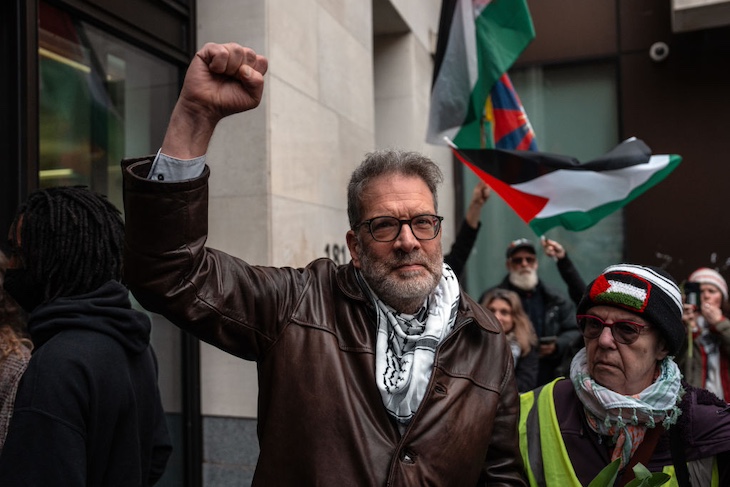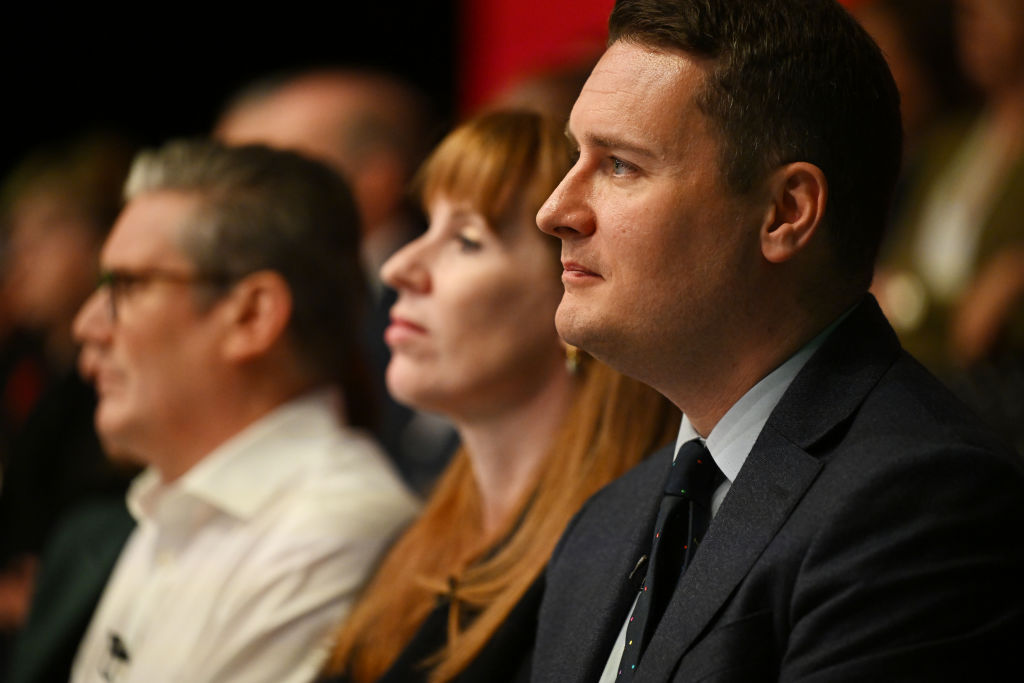The day after the bodies of Ariel and Kfir Bibas were returned to Israel, the Palestine Solidarity Campaign (PSC) holds a protest outside Westminster Magistrates Court on the Marylebone Road.
I am here for the hearing of Ben Jamal, director of the PSC. He is charged with failing to comply with a police request that the January 18th protest avoid the BBC as it is near a synagogue. (The Palestine movement thinks the BBC is a Zionist asset, despite it having to remove a documentary narrated by the son of a Hamas official last week.) The PSC couldn’t stay away and their leaders were charged with public order offences after moving towards the BBC with flowers in their arms. My instinct is: they loved it.
Now they are protesting outside the court for the freedom to protest. You might think the PSC, which, with Stop the War, the Campaign for Nuclear Disarmament, the Muslim Association of Britain and Friends of Al-Asqa, has brought central London to a standstill many times in the last 15 months is aware of its freedom to protest, but narcissists are insatiable.
I queue outside the court from 8 a.m. and they come up to ask if I think keffiyehs and badges are allowed in. They are dependent on costume: they communicate by slogan, signage and badge. They look like social studies professors at failing universities, or bad ceramicists. They initially smile, because they cannot grasp the idea of opposition, or even disagreement.
But Jewish children dear to me have been called ‘dirty Jews’ on London streets. This rarely happened before 2015, and I blame these protestors and associated cretins. There are respectable ways to advocate for Palestine, but they can’t do it because demonizing Jews is an ancient, if sometimes subconscious, European tradition. At the first PSC protest in my hometown Penzance I asked the leader what he wanted. He looked puzzled to be asked, and said he didn’t know.
Inside the court building I watch them from the window laying flowers, waving ‘EXIST, RESIST, RETURN!’ placards and listening to John McDonnell, Socialism’s Batman villain, and Chris Nineham who, as the Westminster and Cambridge-educated son of a former warden of Keble College, Oxford wins Affluent Socialist Bingo for all time. He is chief steward of the marches, and, by his own testimony not an anti-Semite, though he is seemingly unable to prevent blood libel signage and marchers making cut-throat gestures and Hamas triangles – the sign you are a target – at the Jewish counter protests. The protestors seem quite happy for people who think democracy is dying because they cannot protest near a synagogue on a Saturday.
Few come to the public gallery, possibly because placards and megaphones are not allowed in courtrooms. Jamal, who wears a leather jacket and an expression of startled yet sustained self-importance, pleads not guilty to a judge who looks uncannily like Julius from The Thick of It. Jamal asks not to give his address in public because he fears a counter-protest in Kingston-upon-Thames. The judge tells him not to use his phone in the dock, and I wonder if he is playing Candy Crush.
Later, outside, we wait for Jamal to exit. I meet a woman who thinks Palestine should be a secular state: a sort of Rainbow nation. I wish her luck with an endorsement from Islamic Jihad (or the Kahanists). I ask her if she minds that Europe and the Middle East is filled with empty Jewish quarters. She replies, though hesitantly, that might have something to do with the Holocaust. Well, yes. I tell her you can cross Israel in half an hour, and she gawps: does she think it is the size of Russia? A man notices my questions and tells her I am hostile. He appoints himself bodyguard, and when Jamal comes out he stands between us, preening in the manner of the silent who has learned to speak at last.
Coffee cups and placards litter the street. Don’t forget to take your rubbish home with you, I tell a woman as I leave. She replies that I am nasty: why do they talk like children? A masked man notices us and walks towards me, megaphone at his lips, to drown out anything I might say. I forget the slogan. I walk away, flipping the bird with two fingers.
Around the corner, two police officers come up: they say they have received a complaint that I have caused alarm and distress to people who think 7 million Jews should be removed from the Middle East and this is potentially an offence under section 5 of the Public Order Act. (For protestors who think the state is an abomination, they are swift to use it as a tool for the gratification of their own vanity, and the avoidance of pique. They also have infinite pity for themselves). The police say they do not plan to arrest me but – and at this they look almost pleading – do I mind giving them my details? I say I do not, and wave at the megaphone man, who has followed the police to check they are questioning me, because he wants Jewish people to be afraid in our own country. Do you think, I ask the constable, that I have caused alarm and distress? No, she says. Later it occurs to me that I could have made a counter-complaint on the grounds of the megaphone, but I don’t live to inconvenience the police with vexatious complaints.
The trial is set for July. Jamal’s lawyer asks for a large courtroom, as they anticipate significant public interest. I mourn, among other things, Jamal’s summer holidays. Tuscany may have to wait.








Comments